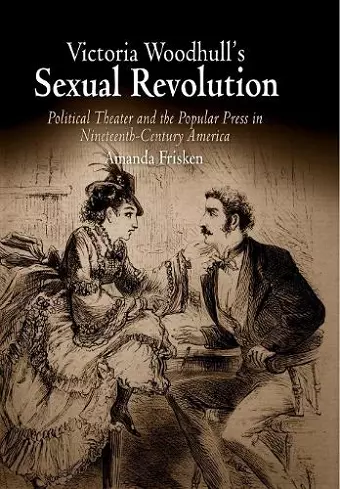Victoria Woodhull's Sexual Revolution
Political Theater and the Popular Press in Nineteenth-Century America
Format:Paperback
Publisher:University of Pennsylvania Press
Published:26th Sep '11
Currently unavailable, and unfortunately no date known when it will be back

Using contemporary sources Frisken takes a fresh look at the heyday of this controversial women's rights activist, discovering Woodhull's previously unrecognized importance in the turbulent climate of Radical Reconstruction and making her a useful lens through which to view the shifting sexual mores of the nineteenth century.
Victoria Woodhull, the first woman to run for president, forced her fellow Americans to come to terms with the full meaning of equality after the Civil War. A sometime collaborator with Susan B. Anthony and Elizabeth Cady Stanton, yet never fully accepted into mainstream suffragist circles, Woodhull was a flamboyant social reformer who promoted freedom, especially freedom from societal constraints over intimate relationships. This much we know from the several popular biographies of the nineteenth-century activist. But what we do not know, as Amanda Frisken reveals, is how Woodhull manipulated the emerging popular media and fluid political culture of the Reconstruction period in order to accomplish her political goals.
As an editor and public speaker, Woodhull demanded that women and men be held to the same standards in public life. Her political theatrics brought the topic of women's sexuality into the public arena, shocking critics, galvanizing supporters, and finally locking opposing camps into bitter conflict over sexuality and women's rights in marriage. A woman who surrendered her own privacy, whose life was grist for the mills of a sensation-mongering press, she made the exposure of others' secrets a powerful tool of social change. Woodhull's political ambitions became inseparable from her sexual nonconformity, yet her skill in using contemporary media kept her revolutionary ideas continually before her peers. In this way Woodhull contributed to long-term shifts in attitudes about sexuality and the slow liberation of marriage and other social institutions.
Using contemporary sources such as images from the "sporting news," Frisken takes a fresh look at the heyday of this controversial women's rights activist, discovering Woodhull's previously unrecognized importance in the turbulent climate of Radical Reconstruction and making her a useful lens through which to view the shifting sexual mores of the nineteenth century.
"Frisken's book provides an enlightening introduction to one of the most controversial characters in American history." * The Historian *
"Frisken provides a lively and well-researched account of what she calls, at one point, 'the Woodhull phenomenon.' And what a phenomenon she was . . . .For Victoria Woodhull the personal was indeed the political, and the highly theatrical interventions in public life that the book primarily engages with revealed just the extent to which she thought, and showed, the two were interleaved . . . [The] book contains many cartoons and sketches of Woodhull, some well known and some less familiar, that help make [the] case that in order to understand the significance of Woodhull's contribution to the radicalism of the 1870s it is necessary to locate her within a culture of personal performance and political theater. [Frisken's] book will help to do just that." * Journal of American Studies *
"Readers seeking a full-scale biography of Woodhull will not find it here, but those interested in the role of print culture in the dissemination of radical social thought will appreciate this richly textured work." * American Historical Review *
"While Frisken's study recounts the events of Woodhull's colorful life, this study is not a conventional biography. Instead, the work focuses upon the period between 1870 and 1876 when Woodhull was at the height of her notoriety. In four chapters, the author explores Woodhull's significance as a symbol of the period's radical sexual politics. Against the backdrop of Reconstruction, Frisken argues convincingly, Woodhull took her status as a disreputable woman and converted it into a political asset in order to generate publicity for her campaign for social change. As evidenced by the numerous pictures woven throughout the study, the popular press and men's sporting magazines depicted Woodhull in the most sexualized terms. Instead of shirking from the limelight in the face of sensationalist news stories about her unconventional lifestyle and beliefs, Woodhull repeatedly engaged in acts of political theater to promote radical change." * Christian Scholar's Review *
"Frisken's particular contribution is on how Woodhull was represented in the cheap illustrated 'sporting papers,' such as The Days' Doings and the Illustrated Police News. Such papers were directed toward young urban men and regularly featured women of questionable character-often emphasizing both their physical bodies and their sexuality. As Frisken ably documents, the targeting of Woodhull and her sister Tennessee Claflin in these papers reveals much about the press's participation in the racial and sexual politics of Reconstruction America." * Legacy *
"Covers all facets . . . of Woodhull's life, and much more." * Journal of American History *
ISBN: 9780812221886
Dimensions: unknown
Weight: unknown
240 pages